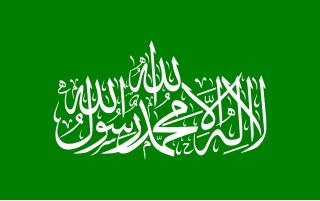
Al-Qaeda is a pan-Islamist militant organization led by Sunni Jihadists who self-identify as a vanguard spearheading a global Islamist revolution to unite the Muslim world under a supra-national Islamic state known as the Caliphate. Its membership is mostly composed of Arabs, but also includes people from other ethnic groups. Al-Qaeda has mounted attacks on civilian, economic and military targets of the US and its allies; such as the 1998 US embassy bombings, the USS Cole bombing and the September 11 attacks. The organization is designated as a terrorist group by NATO, UN Security Council, the European Union, and various countries around the world.
Islamic fundamentalism has been defined as a revivalist and reform movement of Muslims who aim to return to the founding scriptures of Islam. The term has been used interchangeably with similar terms such as Islamism, Islamic revivalism, Qutbism, Islamic extremism, Islamic activism, but also criticized as pejorative, a term used by outsiders who instead ought to be using more positive terms such as Islamic activism or Islamic revivalism.

Ansar al-Islam in Kurdistan, simply called Ansar al-Islam, is a Kurdish Islamist militant and separatist group. It was established in northern Iraq around the Kurdistan Region by Kurdish Islamists who were former Taliban and former Al-Qaeda volunteers, which were coming back from Afghanistan in 2001 after the Fall of Kabul. Its motive is to establish an Islamic state around the Kurdistan region and to protect Kurdish people from other armed insurgent groups. It imposed strict Sharia in villages it controlled around Byara near the Iranian border.
Persecution of Christians in the post–Cold War era refers to the persecution of Christians from 1989 to the present. Part of a global problem of religious persecution, persecution of Christians in this era is taking place in Africa, the Americas, Europe, Asia and Middle East.

Jihadism is a neologism for militant Islamic movements that are perceived as existentially threatening to the West. It has been applied to various insurgent Islamic extremist, militant Islamist, and terrorist individuals and organizations whose ideologies are based on the Islamic notion of jihad. It has also been applied to various Islamic empires in history, such as the Umayyad Caliphate and the Ottoman Empire, who extensively campaigned against non-Muslim nations in the name of jihad.
Sheikh Taissir Bayood al-Tamimi (Arabic: شيخ تيسير التميمي is the chief Islamic judge of the Palestinian National Authority.
There have been several videos released showing Al-Qaeda leader Ayman al-Zawahiri.

Muslim United Liberation Tigers of Assam (MULTA) is an Islamist extremist organization founded around 1996 in the eastern Indian state of Assam by mostly Bengali-origin Muslims and indigenous Muslims in Assam after influenced from Taliban victory in 1996 and establishment of Islamic emirate in Afghanistan Under Sharia the organization demands Assam as an Islamic state under Sharia and separate from India for Muslims of Assam. The South Asia Terrorism Portal (satp.org) describes it as part of the All Muslim United Liberation Forum of Assam (AMULFA), and that Muslim United Liberation Front of Assam (MULFA) is a sister organization under the AMULFA umbrella.
Jund Ansar Allah was an armed radical Islamist organization operating in the Gaza Strip. It was founded in November 2008 by Sheikh Abdel Latif Moussa. On 14 August 2009, Moussa announced the establishment of the al-Qaeda inspired Islamic Emirate of Rafah in the Gaza Strip. The group criticized the ruling power, Hamas, for failing to enforce Sharia law. In response, Hamas attacked the organization, resulting in 24 people killed and a further 150 wounded. After the battle, Jund Ansar Allah ceased to exist.
Jaljalat is an armed Sunni Islamist group operating in the Gaza Strip taking inspiration from al-Qaeda. In September 2009, the organization revealed it had attempted to assassinate former US president Jimmy Carter and Quartet Middle East envoy Tony Blair.

The Committee for the Propagation of Virtue and the Prevention of Vice is a group in the Palestinian territory of Gaza Strip, responsible for enforcing traditional Muslim codes of behavior (Sharia). According to journalist Khaled Abu Toameh and Middle East researcher Dr. Jonathan Spyer, the group forms part of the police forces of the Hamas de facto government.
The Union of Good, also known as the Charity Coalition, is an umbrella organization consisting of over 50 Islamic charities and funds which funnel money to organizations belonging to Hamas, which currently rules the territory of the Gaza Strip. Hamas, which characterizes itself as an "Islamic resistance movement against Israeli occupation" is also on the US State Department list of Foreign Terrorist Organizations.

Islamism in the Gaza Strip involves efforts to promote and impose Islamic laws and traditions in the Gaza Strip. The influence of Islamic groups in the Gaza Strip has grown since the 1980s. Following Hamas' victory in the 2006 Palestinian elections and a conflict with supporters of the rival Fatah party, Hamas took complete control of the Gaza Strip, and declared the "end of secularism and heresy in the Gaza Strip". For the first time since the Sudanese coup of 1989 that brought Omar al-Bashir to power, a Muslim Brotherhood group rules a significant geographic territory. Gaza human-rights groups accuse Hamas of restricting many freedoms.
Islamism a religio-political ideology that seeks to revive Islam to its past assertiveness and glory, purify it of foreign elements, reassert its role into "social and political as well as personal life" where "government and society are ordered in accordance with laws prescribed by Islam".

The Sheikh Omar Hadid Brigade, also known as Islamic State in Gaza, is an Islamist militant group affiliated with the Islamic State in Iraq and the Levant that was reportedly active in the Gaza Strip around 2015. Its goals have consistently matched those of the Islamic State, in that it seeks to establish the al-Sham caliphate. As such, it opposes all forms of Palestinian nationalism while also supporting the elimination of all Jews and other ethno-religious 'infidels' from the region.
Qatar has been accused of allowing terror financiers to operate within its borders, which has been one of the justifications for the Qatar diplomatic crisis that started in 2017 and ended in 2021. In 2014, David S. Cohen, then United States Under Secretary of the Treasury for Terrorism and Financial Intelligence, accused Qatari authorities of allowing financiers who were on international blacklists to live freely in the country: "There are U.S.- and UN-designated terrorist financiers in Qatar that have not been acted against under Qatari law." Accusations come from a wide variety of sources including intelligence reports, government officials, and journalists.
Starting in the mid-1970s and 1980s, Salafism and Wahhabism — along with other Sunni interpretations of Islam favored by the Kingdom of Saudi Arabia and other Gulf monarchies — achieved a "preeminent position of strength in the global expression of Islam."

Jaysh al-Ummah al-Salafi fi Bayt al-Maqdis, also known as Jaysh al-Ummah fi Aknaf Bayt al-Maqdis or just Jaysh al-Ummah, is a small Gaza Strip-based Palestinian and Salafi jihadist militant organization. The group is supportive of al-Qaeda and critical of Hamas.

Jamaat Ansarullah, also known as the Tajikistani Taliban, is a Tajik Islamist militant movement currently based out of Badakhshan, Afghanistan. It is related to al-Qaeda.
The religio-political ideology of Islamism which has "arguably altered the Middle East more than any trend since the modern states gained independence", redefining "politics and even borders" (according to at least one observer, is active in many countries around the world.








